Democracy and citizenship
Pascale Joannin
-

Available versions :
EN

Pascale Joannin
The European elections were held from 6 to 9 June in the 27 Member States of the European Union. Turnout was higher than in 2019, demonstrating that people feel more concerned by European issues.
No change to the main balance
This tenth European election reveals the dominance of the European People's Party (EPP), which remains the largest group with 186 seats, and the Party of European Socialists (PES), whose S&D Group remains second with 135 seats. Once again, these are the only two groups to exceed the threshold of 100 MEPs.
Renew, which exceeded the threshold in 2019 (102), has lost ground due in particular to the very poor result of Renaissance in France (14.6%) - compared with 22.42% in 2019 - and the poor result of the FDP in Germany (5.2%). The group is currently holding on to third place with 80 elected members.
With 400 seats, these three groups form the only possible majority coalition, as we wrote earlier this year.
We might therefore conclude that the main political balances were already established in 2019. The loss of the absolute majority by the two main groups was a real change, as they had dominated Parliament since the first elections by direct universal suffrage in 1979.
A contained push to the right
Many observers feared a strong surge in radical right-wing, nationalist populist and even extreme parties. They are certainly making progress, but more limited than expected.
In the Conservatives and Reformists (ECR) group, the Fratelli d'Italia (FdI) party of the President of the Council, Giorgia Meloni, came out ahead in Italy, which was expected, but this is the only case. Poland's Law and Justice (PiS) came second, as did the N-VA in Belgium, Vox came third in Spain with less than 10%, the Sweden Democrats (SD) were only fourth after coming second in the last general election in 2022, and the True Finns, members of the government, finished sixth. So, this was no landslide.
In the Identity and Democracy (ID) group, Geert Wilders' PVV failed to repeat the feat of finishing first that it achieved in the general election of 22 November 2023. It was beaten by the Left-Green coalition. In Belgium, Vlaams Belang edged out the N-VA by a hair's breadth... but the N-VA overtook Vlaams Belang in the federal parliament, where general elections were held on the same day. The Italian Lega, which was the group's main delegation in the outgoing parliament, has seen its results plummet. It will go from 22 elected members to 8. In Portugal, Chega came third with less than 10%.
Only two countries saw a party from this group come out in first place. In Austria, the FPÖ obtained 27% of the vote, but was trailed by the Chancellor's ÖVP (EPP) and above all France, where the Rassemblement National surpassed the 30% threshold (31.5%), beating the Renaissance party by more than double the number of votes.
France — a specific case
This defeat has led to an unprecedented political situation in France. In an address on the evening of 9 June, the French President, drawing the consequences of this result, decided to dissolve the National Assembly (the lower house of the French parliament). This is the first time that the results of the European elections have had such an impact on French political life, despite the fact that on several occasions the parties in government have found themselves in difficulty in these polls. There will be legislative elections on 30 June and 7 July next.
Consequences for the Commission Presidency
The European People's Party is still by far the largest group and can lay claim to the presidency of the Commission. Last March, it nominated the outgoing President of the European Commission, Ursula von der Leyen, as head of its list for a second term. This time, unlike in 2019, she has secured the support of her party in Germany, the CDU, and that of the EPP.
As the first female president, she can draw on the experience she has acquired over the last five years. Her candidacy must be "proposed" by the European Council, which will meet informally on 17 June, followed by a summit on 27 and 28 June. This will be the first step in appointing the top jobs at European level. The other major political forces, the PES and Renew, will have to come to an agreement on the basis of a political division between the Presidency of the European Council (PES) and the post of High Representative for Foreign Affairs (Renew). In 2019, Renew won the Presidency of the European Council and the PES the post of High Representative.
If this is the case, it will need a majority of votes (361) in the European Parliament at the next plenary session in Strasbourg (16-19 July). In 2019, when she was appointed by the European Council to replace the candidate nominated by the EPP, she obtained only a narrow majority of 9 votes. It should be different this year, even if she has to campaign to make up for possible defections from her camp.
It is hard to see what credible alternatives might emerge, as this could disrupt an already very tight timetable for her to take office by the end of the year. Europe needs to be up and running if it is to meet and overcome the challenges it faces.
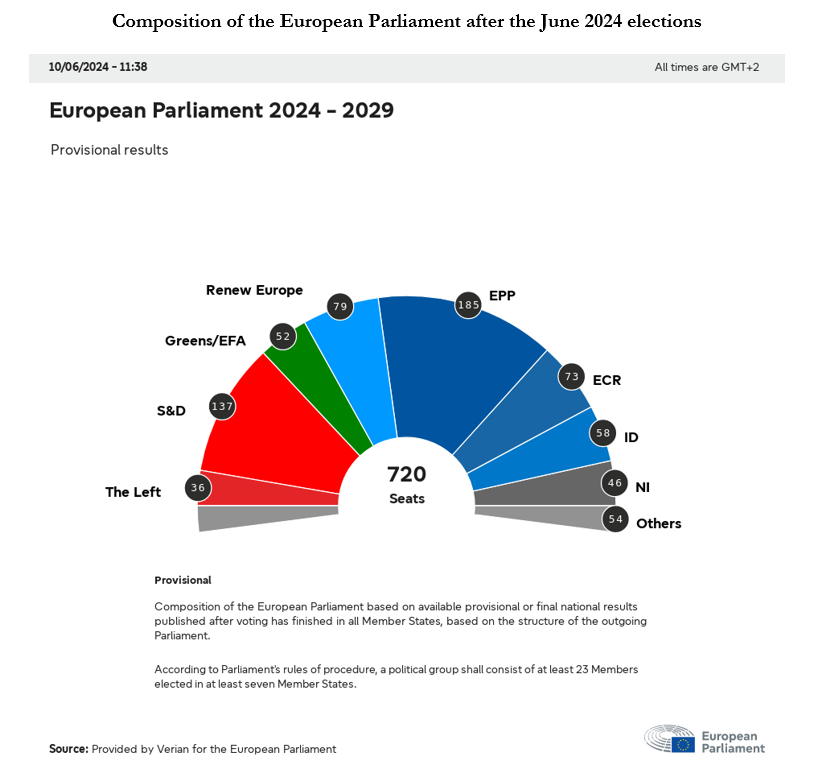
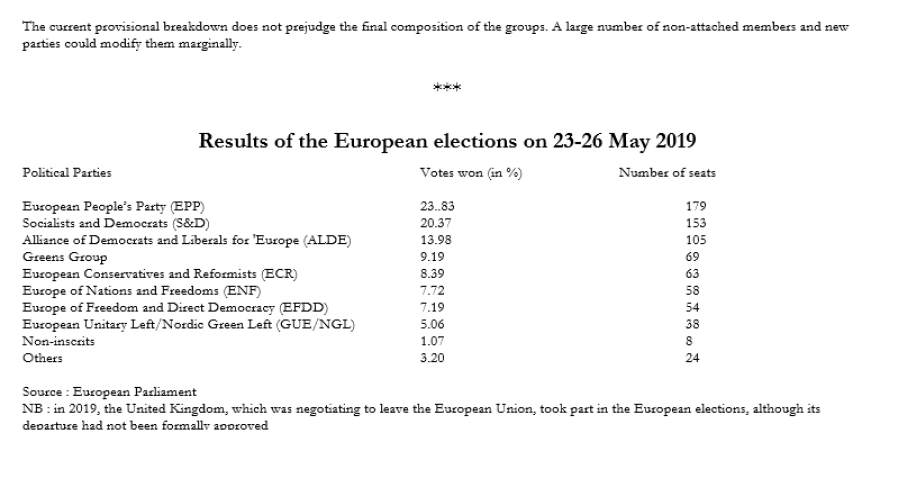
AUSTRIA
20 SEATS
https://2024.electionseuropeennes.eu/autriche/
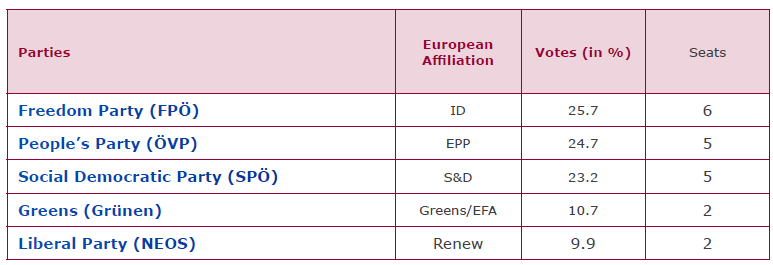
BELGIUM
22 SEATS
https://2024.electionseuropeennes.eu/belgique/
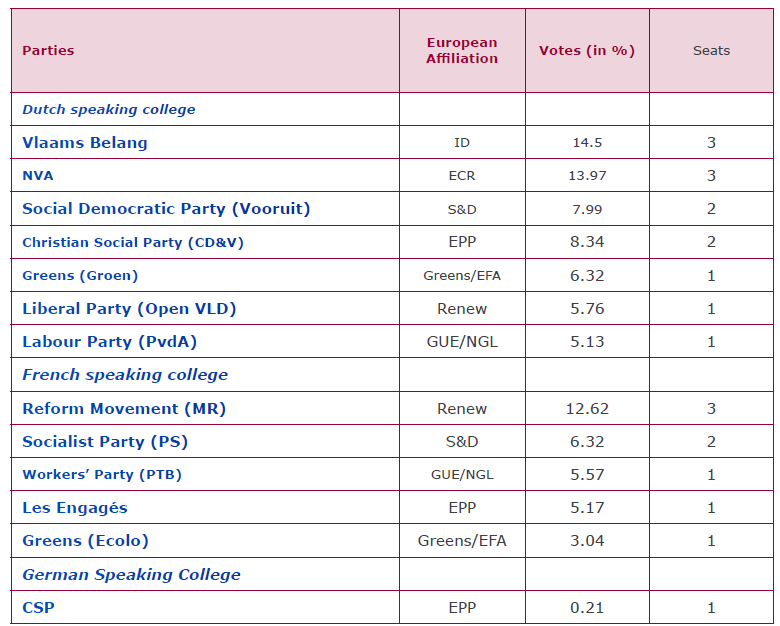
BULGARIA
17 SEATS
https://2024.electionseuropeennes.eu/bulgarie/
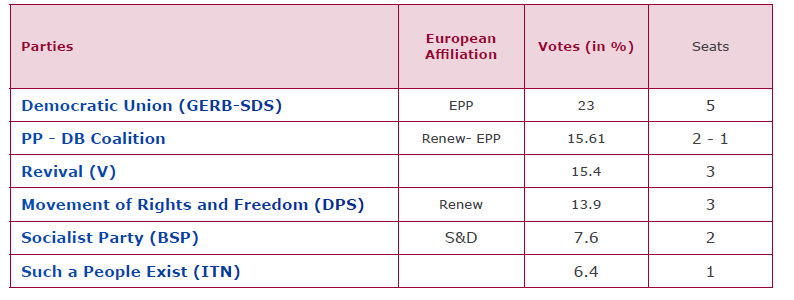
CROATIA
12 SEATS
https://2024.electionseuropeennes.eu/croatie/

CYPRUS
6 SEATS
https://2024.electionseuropeennes.eu/chypre/
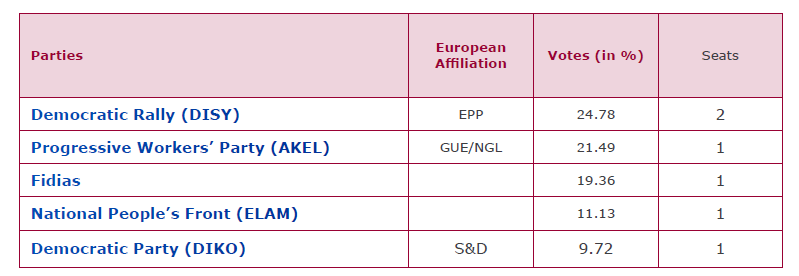
CZECH REPUBLIC
21 SEATS
https://www.electionseuropeennes.eu/en/czech-republic
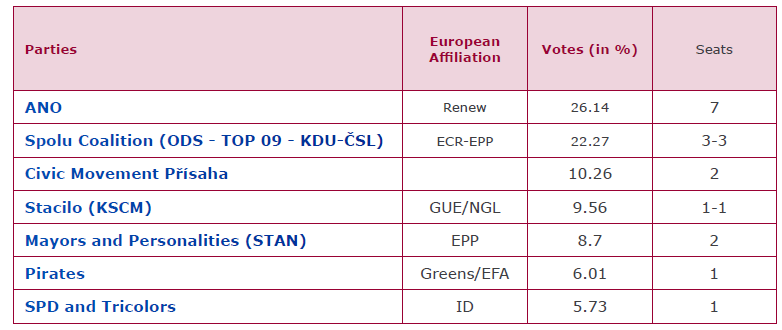
DENMARK
15 SEATS
https://2024.electionseuropeennes.eu/danemark/
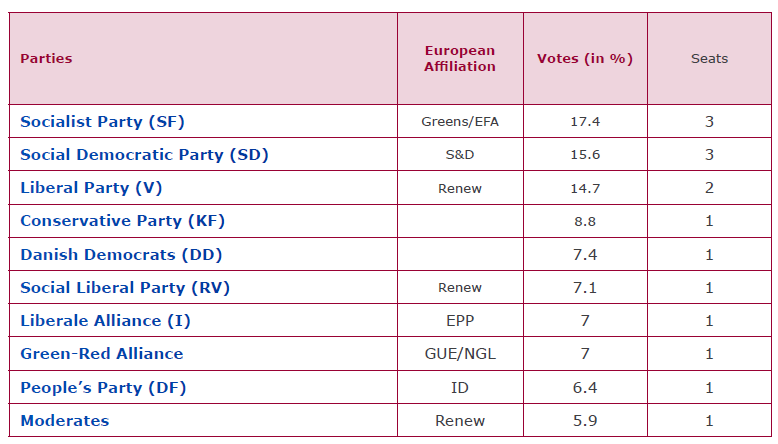
ESTONIA
7 SEATS
https://2024.electionseuropeennes.eu/estonie/
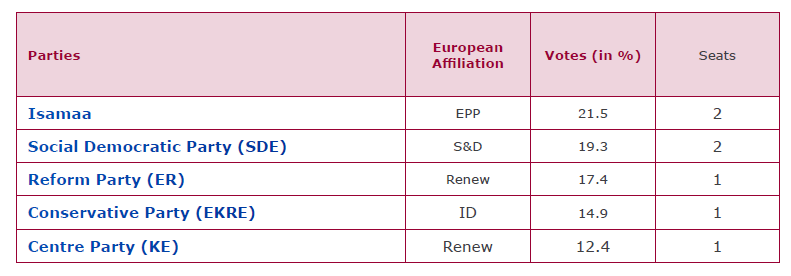
FINLAND
15 SEATS
https://2024.electionseuropeennes.eu/finlande/
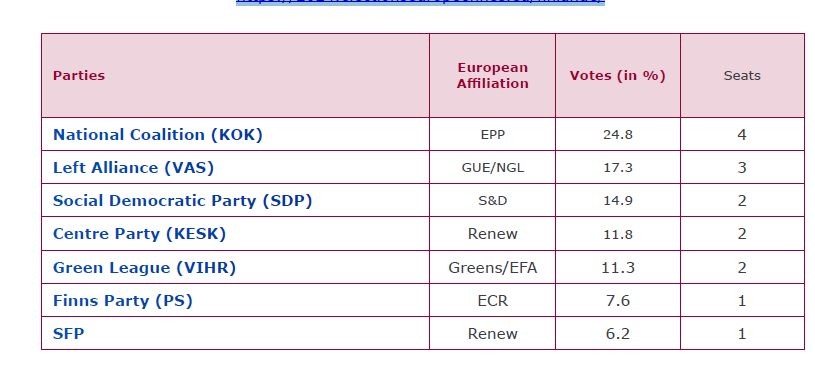
FRANCE
81 SEATS
https://2024.electionseuropeennes.eu/france/
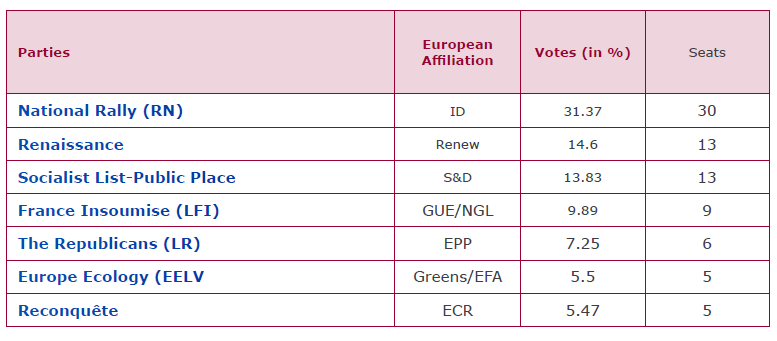
GERMANY
96 SEATS
https://2024.electionseuropeennes.eu/allemagne/
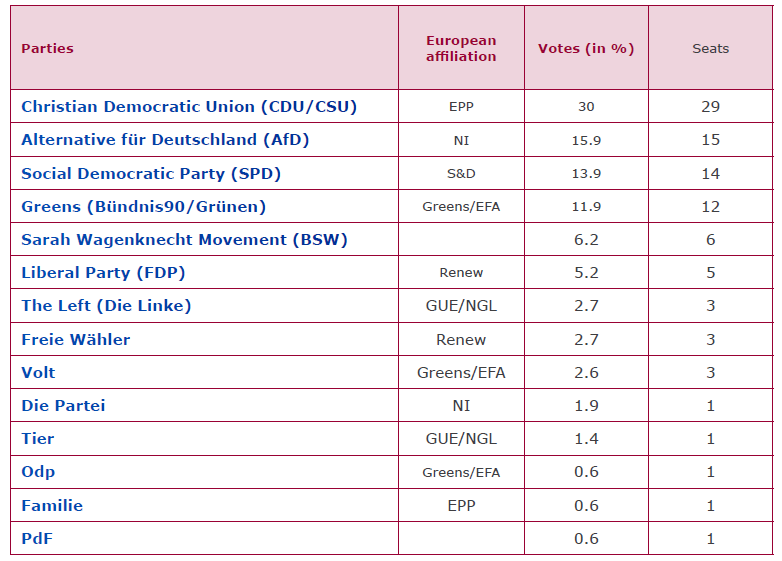
GREECE
21 SEATS
https://2024.electionseuropeennes.eu/grece/
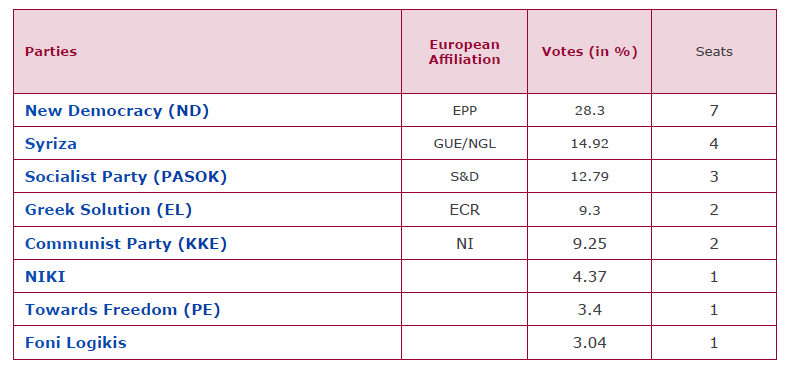
HUNGARY
21 SEATS
https://2024.electionseuropeennes.eu/hongrie/

IRELAND
14 SEATS
https://2024.electionseuropeennes.eu/irlande/
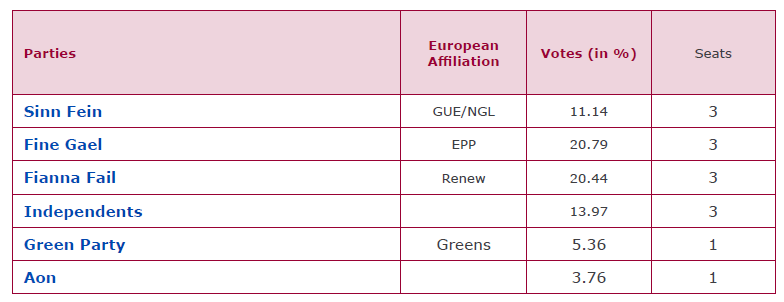
ITALY
76 SEATS
https://2024.electionseuropeennes.eu/italie/
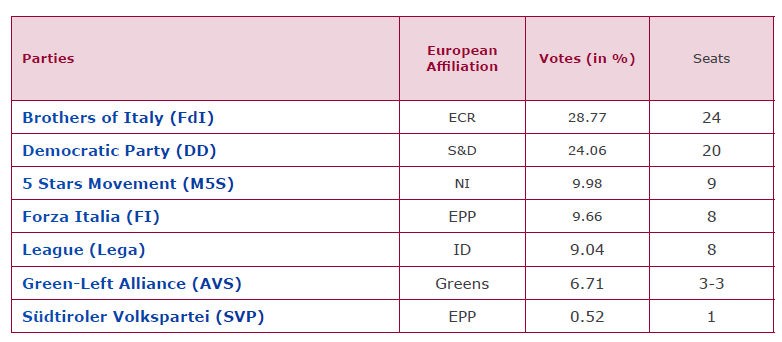
LATVIA
9 SEATS
https://2024.electionseuropeennes.eu/lettonie/
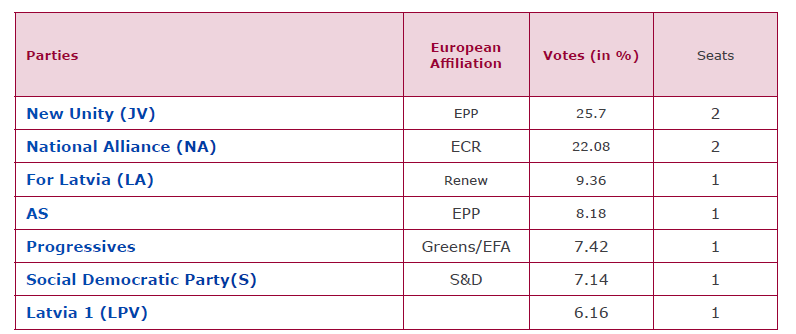
LITHUANIA
11 SEATS
https://2024.electionseuropeennes.eu/lituanie/
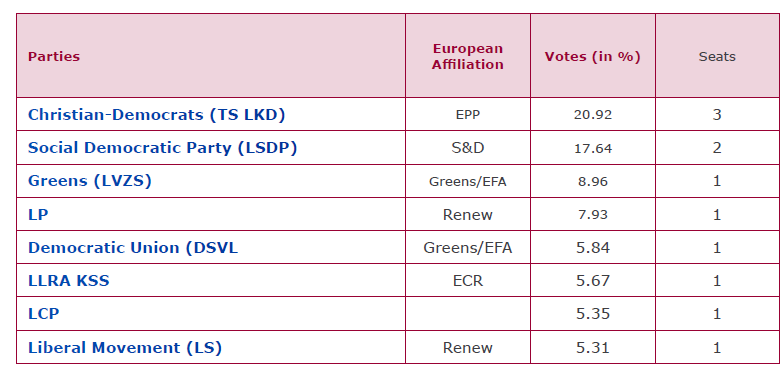
LUXEMBOURG
6 SEATS
https://2024.electionseuropeennes.eu/luxembourg/
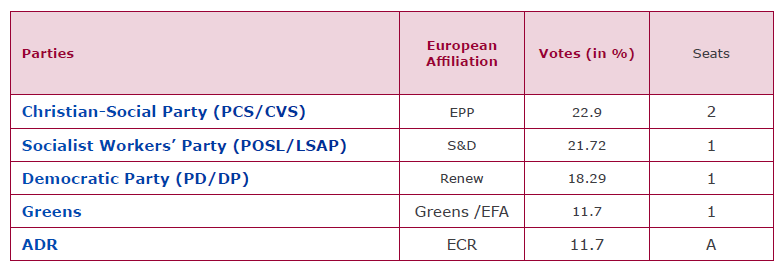
MALTA
6 SEATS
https://2024.electionseuropeennes.eu/malte/

NETHERLANDS
31 SEATS
https://2024.electionseuropeennes.eu/pays-bas/
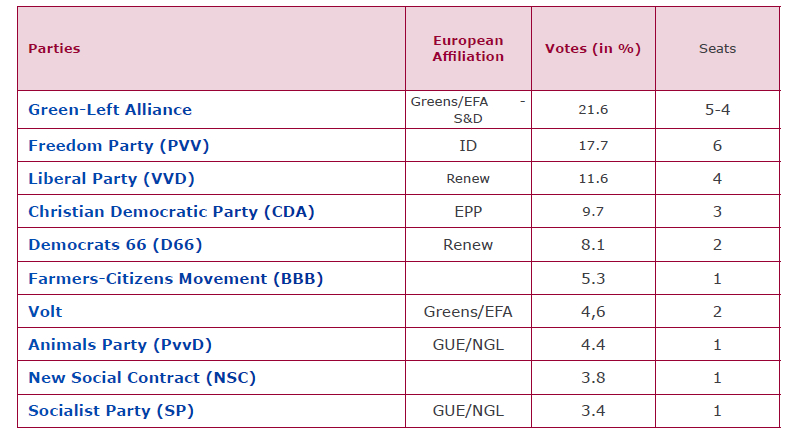
POLAND
53 SEATS
https://2024.electionseuropeennes.eu/pologne/
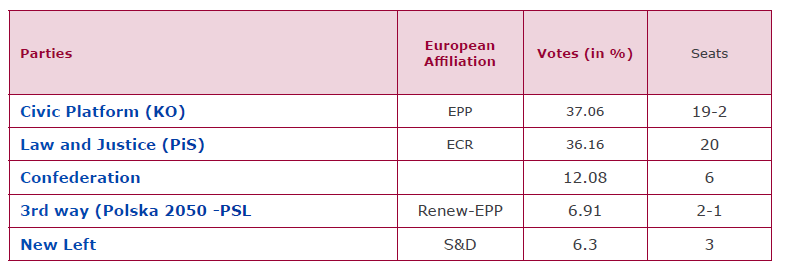
PORTUGAL
21 SEATS
https://2024.electionseuropeennes.eu/portugal/
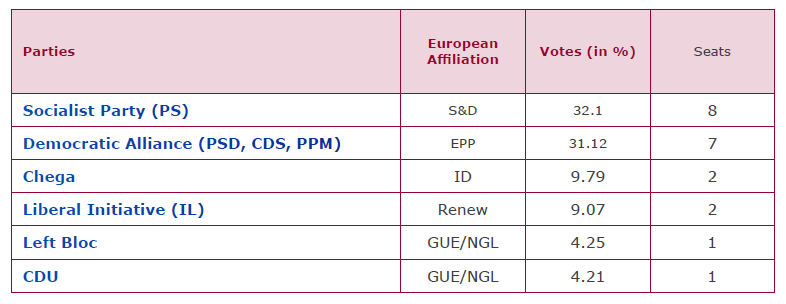
ROMANIA
33 SEATS
https://2024.electionseuropeennes.eu/roumanie/

SLOVAKIA
15 SEATS
https://2024.electionseuropeennes.eu/slovaquie/
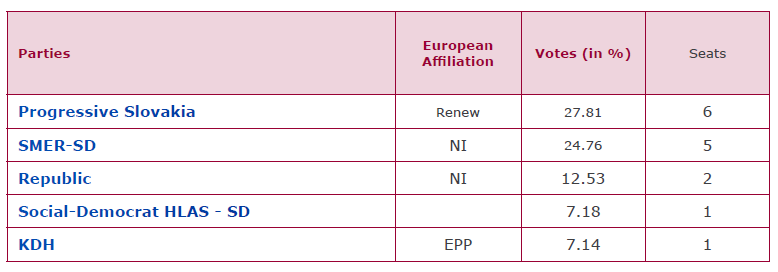
SLOVENIA
9 SEATS
https://2024.electionseuropeennes.eu/slovenie/
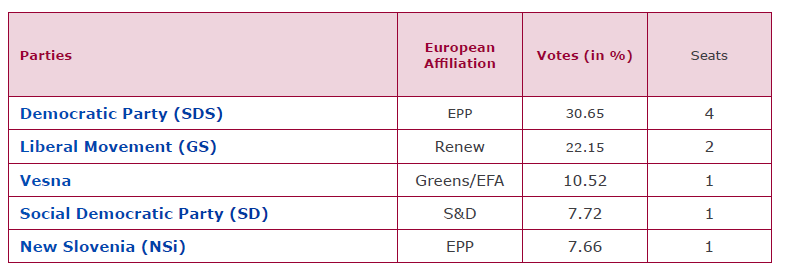
SPAIN
61 SEATS
https://2024.electionseuropeennes.eu/espagne/
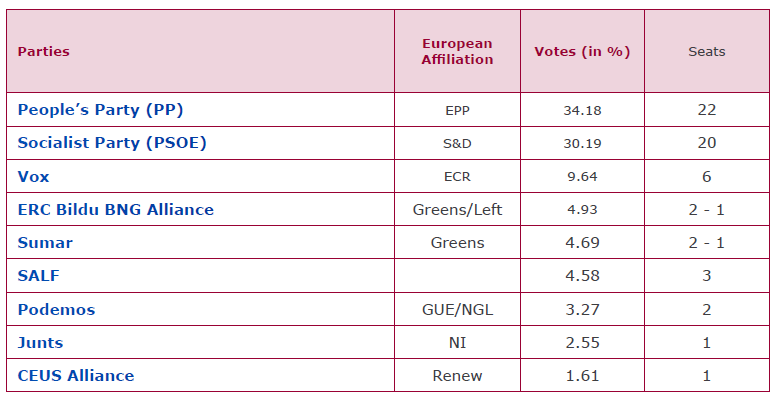
SWEDEN
21 SEATS
https://2024.electionseuropeennes.eu/suede/
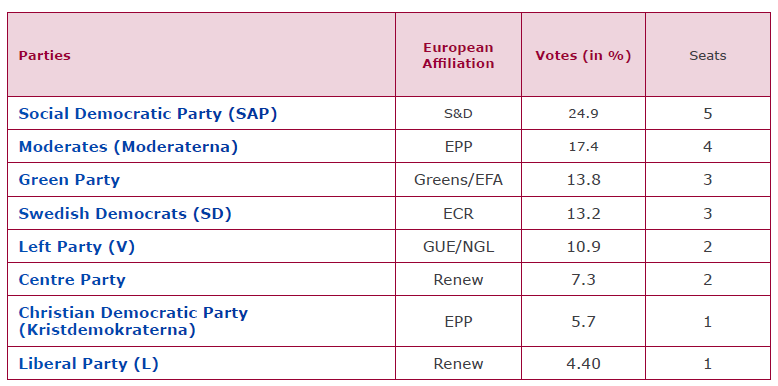
Publishing Director : Pascale Joannin
On the same theme
To go further
Freedom, security and justice
Jean Mafart
—
15 April 2025
Asia and the Indo-Pacific
Pierrick Bouffaron
—
8 April 2025
Democracy and citizenship
Radovan Gura
—
25 March 2025
Strategy, Security and Defence
Stéphane Beemelmans
—
18 March 2025

The Letter
Schuman
European news of the week
Unique in its genre, with its 200,000 subscribers and its editions in 6 languages (French, English, German, Spanish, Polish and Ukrainian), it has brought to you, for 15 years, a summary of European news, more needed now than ever
Versions :




